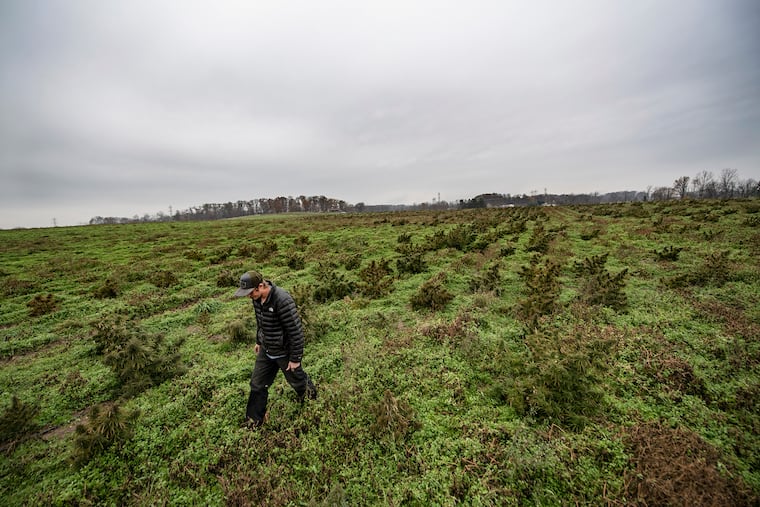People keep stealing hemp in Pennsylvania and beyond, thinking it’s weed
Industrial hemp, now legal to grow in all 50 states, is often being stolen by people who think it's marijuana.

People see the serrated leaves and the fuzzy buds from afar, but it’s the familiar smell wafting over the field that seals the deal. They pack a not-so-brilliant idea into their heads and scramble to yank the hardy plants right from the soil. Back home, they light up and sit sober in the smoke, writing off their heist as a bunch of schwag.
Hemp resembles marijuana, its much more psychoactive cousin, in just about every way except one: It probably won’t get you high. Pennsylvanians caught stealing hemp still haven’t figured that out.
“I thought I was in pot heaven,” said one young man caught in the act on Halloween.
The hemp was lifted from Ashleigh Baldwin’s crop. Hemp was legalized for growing in the United States last year, and Baldwin cultivates 50 acres of it on a dairy farm straddling Bucks and Lehigh Counties. She uses the hemp oil to make cbdelight, a line of CBD (cannabidiol) sodas. Medicinal marijuana, legal in 33 states including Pennsylvania, is usually grown indoors.
The Halloween theft wasn’t the first time Baldwin’s been hit.
“There’s a lot of these dumb 18-year-olds out there doing this,” she said.
Across the country, marijuana and hemp products are hurtling toward a ho-hum ubiquity, and someday, the whiff of both may be as common in Pennsylvania as cow dung and fried onions.
Industrial hemp was used for centuries to make fiber, paper, food, and fuels until the Marihuana Tax Act of 1937 effectively put the kibosh on all cannabis. Only a year into hemp’s re-legalization, its oil is being touted as a treatment for a slew of ailments, from epilepsy to anxiety and inflammation. CBD products are appearing in health stores and even on supermarket shelves, and Carl’s Jr., a national fast-food franchise, served up a CBD burger called the Rocky Mountain High this year. But many people still act on some primal urge when they see a field of hemp, thinking it’s something else. They steal from the Amish and from farms in Vermont; in Ventura County, Calif., a 70-year-old man was caught stealing hemp last week.
“CBD cannot get you high. You can smoke a whole telephone pole of this without having any effect,” farmer Dale Weed told local news after repeated thefts in Wayne County, N.Y., last month.
Many hemp farms have signage informing passersby that the crops do not contain THC, the active mind-altering substance in marijuana. (Legal hemp is supposed to contain 0.3% THC or less, but crops can vary.) Baldwin uses air cannons to scare away the deer from her hemp, but the land is unfenced. She assumed common sense would prevail, that any would-be thief would stop and wonder why marijuana would be cultivated so openly.
The first theft from Baldwin’s crop occurred on Oct. 11, when a young man stole a plant, threw it in his trunk, and sped off, only to be pulled over by Pennsylvania state police a short time later. The plants can reach heights of 16 feet.
“It was like a Christmas tree of hemp,” Baldwin said. “The officer could smell it before he got out of his car.”
Police have no easy way to test whether a plant is legal hemp or marijuana. Both test positive for cannabinoids. Baldwin believes that’s why a state police vice squad showed up after the theft, looking for an illegal grow operation.
“Even the police thought we were growing marijuana,” Casey Parzych, Baldwin’s husband and business partner, said on the farm last week.
Neither a spokesman for the state police’s Bethlehem barracks nor the investigator who showed up at the farm that day returned requests for comment. Baldwin declined to press charges against the thief.
The second heist occurred on Halloween, when three young men snatched and ran. They were caught by state police in Fogelsville, Lehigh County. Baldwin again did not press charges, hoping that the culprits — two aged 18, the other 19 — would spread the word to friends. They agreed to speak to The Inquirer at the farm on condition of anonymity. The mother of one of them came, too.
They said they likely wouldn’t have stolen the hemp had they known what it was. Signs might work, they added.
“Then again, kids are stupid,” one said. “I mean we were stupid, too.”
Trooper Brent Miller, a state police spokesman, said that the hemp incident was the first reported at the Fogelsville barracks.
The thefts didn’t cripple Baldwin and Parzych’s crop, but they’re a distraction during the harvest, when farmhands are working long hours to cut the plant and dry it in heated storage units once used for tobacco.
After the plants dry, the stalks and stems are separated from the buds and leaves used to make the oil. The website weedmaps.com says a 1-ounce bottle of CBD oil can cost from $30 to $200.
Brenden Pakebusch, a Texas native working on the farm, said he never could tell the difference between hemp and marijuana. The smell saturates his clothes and his Volkswagen SUV.
“It’s not something you could tell by looking at it,” he said.
Erica Stark, executive director of the National Hemp Association, said there have been “some instances of hemp” theft in Pennsylvania, but she didn’t know if all of them were cases of mistaken identity. Hemp, she says, has its own value.
It’s just not going to get you high.